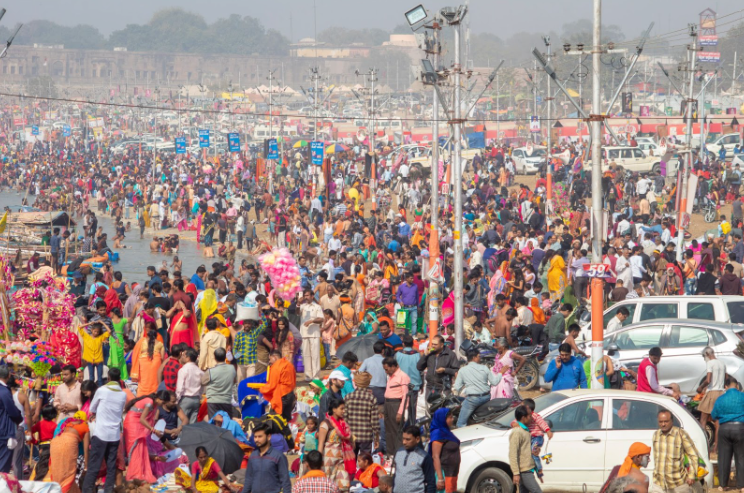Sustainable Travel and Event Waste Management at Large-Scale Events: A Call-to-Action for Individuals and Governments
The recent report1 on the staggering 30,000 metric tons of garbage left behind by the Kanwar yatra in Haridwar is a sobering reminder of the urgent need to address waste management and sustainable travel practices. Such enormous waste generation poses a significant threat to the environment, especially in places where crowds surge. According to reports, an astonishing 10,000 tonnes of faecal waste was washed into the Ganga river due to open defecation common during the event.
This is a clearly dire situation. According to the World Bank2, the sprawling Ganga basin, with an area of 860,000 sq km spread across 11 states, is the world’s most populous river basin. To Indians, the spiritual and cultural significance of the river runs deeper than its waters. It is worshipped as a living goddess and yet today we see Ganga on the list of world's 10 most endangered rivers.
It is high time that we collectively take responsibility for our actions and work towards solutions to mitigate the ecological crisis of waste generated at large-scale events. Any planning for an event of such magnitude needs to begin from the question of what environmental impact will have to be handled with it.
The occurrence of many such events is annual and therefore the environmental outcomes are foreseeable. In this article, we explore practical measures at both the individual and policy levels to promote sustainable travel and curb waste generation..
Measures at Individual Level:
- Pack Light and Smart: Travellers can adopt minimalist packing to reduce unnecessary waste. Choose reusable items such as water bottles, utensils, and shopping bags to minimise single-use plastic consumption.
- Opt for Eco-friendly Transportation: Whenever possible, choose eco-friendly transportation options like trains, buses, or carpooling. These alternatives significantly reduce carbon emissions compared to individual vehicle usage.
- Embrace Sustainable Accommodation: Seek eco-conscious hotels, hostels and lodgings that implement energy-efficient practices, and sustainable waste management systems. There are many places recommended with real reviews about the eco-conscious practices of a place. They might not be necessarily labelled for “green initiatives” but are simplistic and offer the basics. Assess your lodging for sustainability before booking.
- Don’t Litter and Don’t Let Litter: Respect the environment and local communities by disposing of waste responsibly. Carry a portable trash bag to collect your trash until you find a suitable disposal point. Pause and politely stop others from littering too.
- Support Local Initiatives: Engage in community-based ecotourism activities that promote conservation efforts and directly contribute to the local economy. For example, if you’re visiting any of the Ganga basins, you might consider volunteering with the Ganga Mitras3 for walkathons, street theatre displays, gathering information on river health, species conservation work and much more.
Measures at Policy Level:
- Strengthen Waste Management Infrastructure: Governments must invest in advanced waste management infrastructure in areas experiencing heavy footfall. Efficient waste collection and recycling facilities can handle large crowds and prevent garbage accumulation.
- Focus on Handling Open Defecation: We need to ensure a robust toilet infrastructure and impose a ban on open defecation. It is a serious threat to both health and the environment.
- Promote Waste Reduction Campaigns: Implement public awareness campaigns that educate people about waste management, sustainable practices, and the environmental impact of littering. Social media and educational programs can be powerful tools in disseminating this information.
- Introduce Incentives for Sustainable Tourism: Governments can offer tax breaks or incentives to businesses that adopt sustainable practices, encouraging more eco-friendly tourism.
- Enforce Stricter Penalties: Imposing fines for littering and improper waste disposal can act as a deterrent and instil a sense of responsibility among travellers and pilgrims.
- Collaborate with NGOs and Local Communities: Partnering with non-governmental organisations and local communities can foster collective efforts in maintaining cleanliness and sustainable tourism practices. A model example of this is the work done by Ganga Mitras, a programme bringing together citizens for the sustainable conservation of Ganga started by the WWF4 in 2013.
The waste generation issue at any crowd-pulling venue/event, demands immediate attention and concerted action. Sustainable travel practices and effective waste management need to occupy a prime position in planning large-scale events.
As individuals, we can make conscious choices to reduce our ecological footprint, while governments must implement robust policies and initiatives to ensure a cleaner, greener, and healthier world. The Ganga river, along with our planet, deserves nothing less than our utmost dedication to sustainability.
References:
- https://timesofindia.indiatimes.com/city/dehradun/kanwariyas-leave-behind-30000-mt-ton-garbage-at-haridwar/articleshow/101792559.cms?from=mdr
- https://www.worldbank.org/en/news/feature/2015/03/23/india-the-national-ganga-river-basin-project
- https://spmguttarakhand.uk.gov.in/pages/display/135-ganga-mitra
- https://www.wwf.org.uk/sites/default/files/2017-06/170616_Ganga_Mitras_CS-external.pdf


